NFC zu D-S-04
In diesem Schrank befinden sich einschlägige Bücher, die das Denken zwischen 1902 und 1942 wiedergeben. Aus jedem Buch gibt es ein Zitat, das den Kerngedanken vermittelt. Da die Bücher abwertende Texte und Bilder enthalten, sind sie unter Verschluss.
In diesem Schrank
stehen wichtige Bücher.
Die Bücher sind
aus den Jahren 1902 bis 1942.
Wir haben aus jedem Buch
einen sehr wichtigen Satz rausgeschrieben.
Das nennt man auch: Zitat.
Mehr zeigen wir von den Büchern nicht.
Denn in diesen Büchern stehen
schlechte Dinge über Kranke.
Sie werden mit schlechten Worten und Bildern beschrieben.
Darum sind die Bücher verschlossen.

Joseph Arthur de Gobineau: Versuch über die Ungleichheit der Menschenracen (1902).
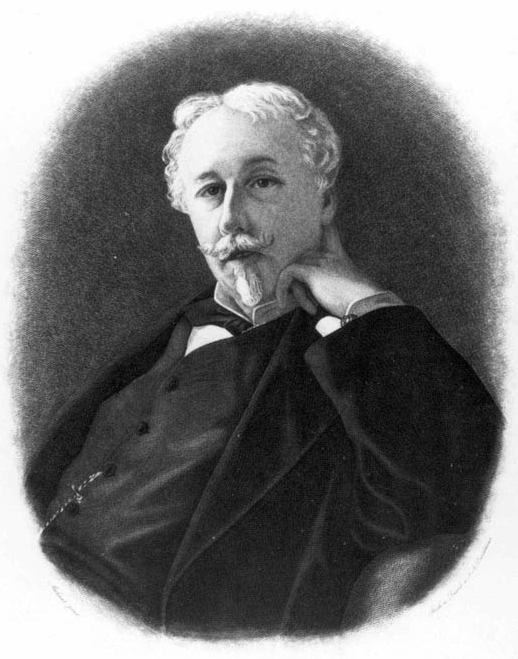
Joseph Arthur de Gobineau, 1876.
Kopie ArEGL.
»Das eben lehrt uns die Geschichte. Sie zeigt uns, daß jede Civilisation von der weißen Race herstammt, daß keine ohne die Beihilfe dieser Race bestehen kann, […]« (S. 285)
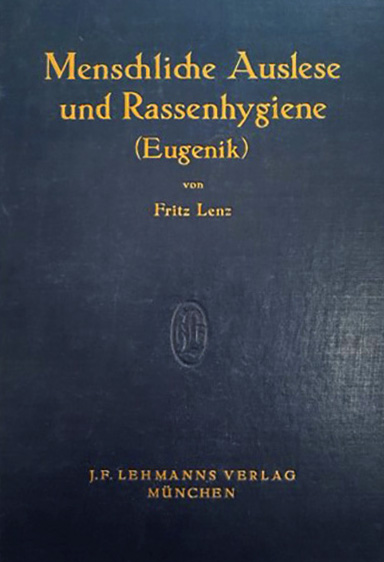
Fritz Lenz: Menschliche Auslese und Rassenhygiene (1932).

Fritz Lenz, nach 1945.
Archiv der Max-Planck-Gesellschaft, Berlin,
VI. Abt., Rep. 1, Lenz, Fritz 2. Fotograf A. Blankhorn.
»Wir werten den Fortschritt der Kultur, den Fortschritt der Erkenntnis der Technik, der Wirtschaft. Die bahnbrechenden Führer dieses Fortschritts werden als große Geister gepriesen. Das alles aber wird sinnlos, wenn die Kultur infolge Entartung der Rasse zusammenbricht […]« (S. 554)
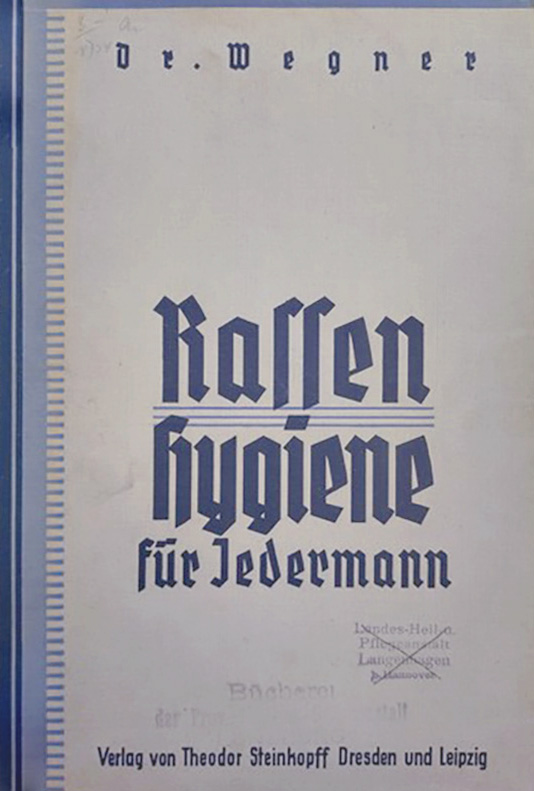
Ernst Wegner: Rassenhygiene für Jedermann (1934).
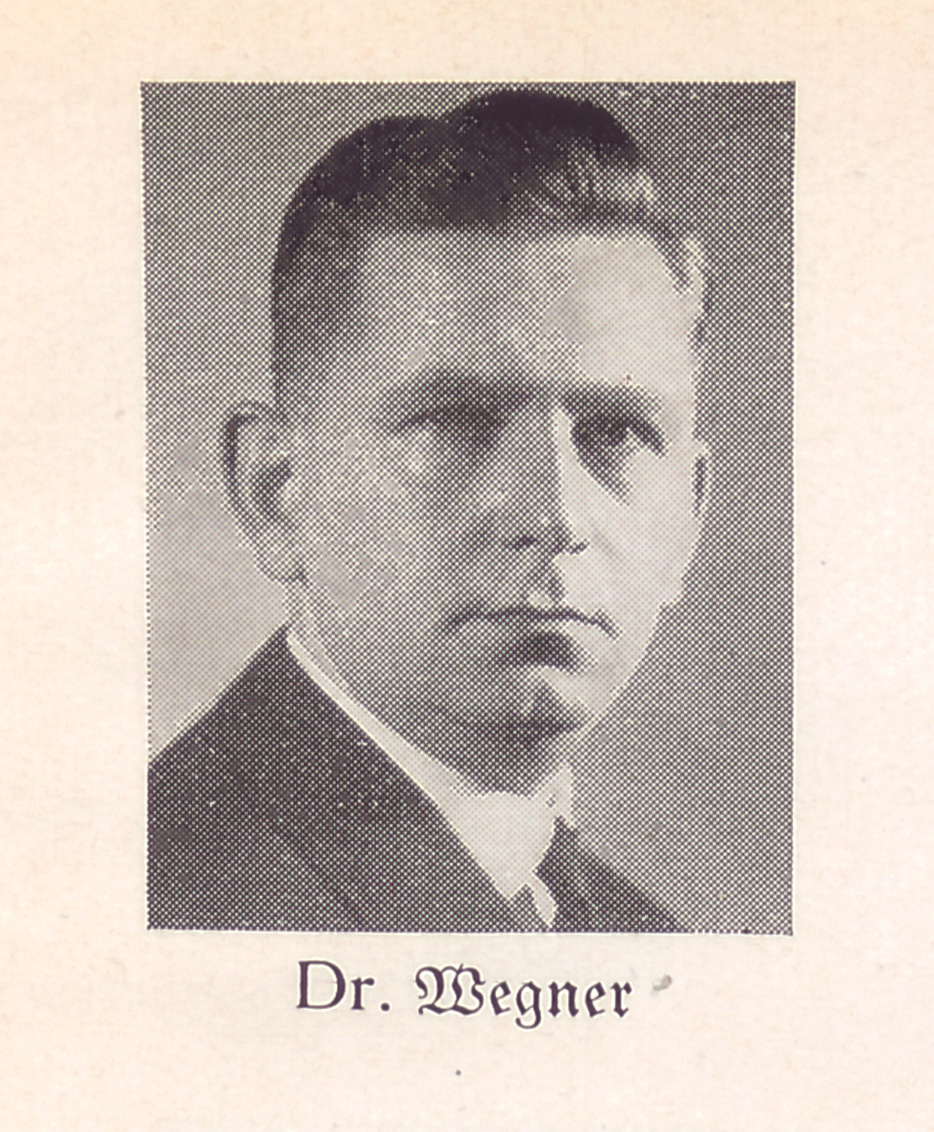
Ernst Wegner, 1933. In: Deutscher Reichstag, Reichstags-Handbuch, 8. Wahlperiode, Berlin 1933, S. 367 [Ausschnitt].
Bayerische Staatsbibliothek. BA/Germ.g 390c-1933.
»[…] und der erbgesunde und erbtüchtige Steuerzahler ist es, der die Wohlfahrtslasten zu tragen hat. Während für Kinder Erbgesunder öffentliche Mittel nur in den seltensten Fällen zur Verfügung stehen, müssen Schwachsinnige und Verbrecher aus öffentlichen Mitteln unterhalten werden.« (S. 157f)
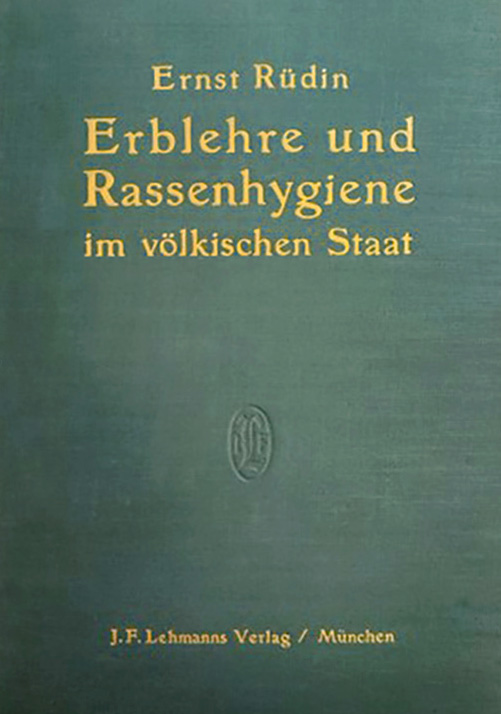
Ernst Rüdin: Erblehre und Rassenhygiene im völkischen Staat (1934).
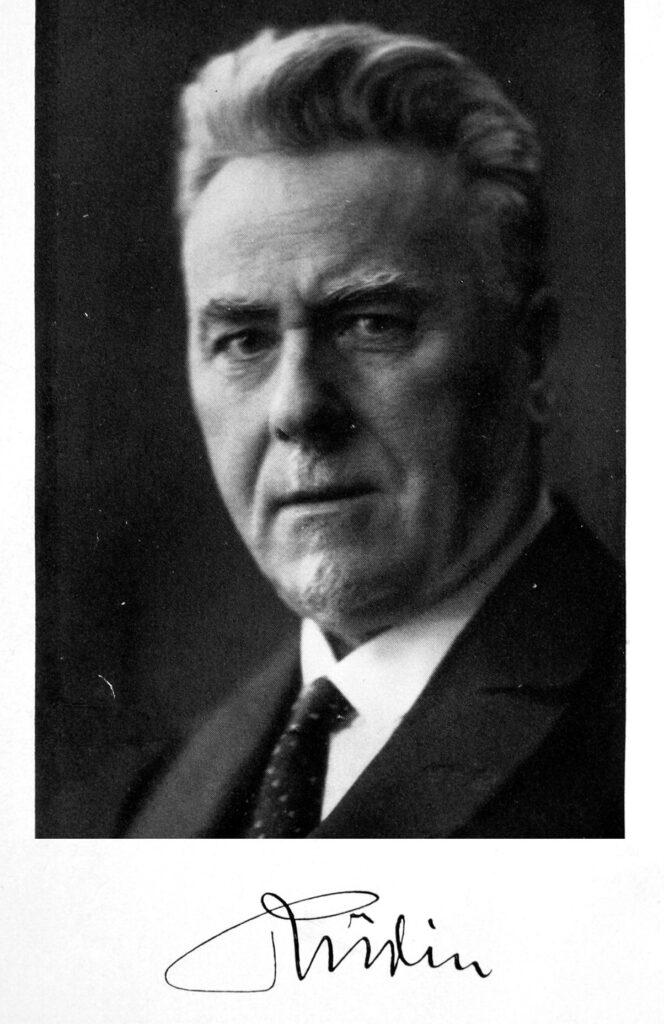
Ernst Rüdin, um 1935.
Kopie ArEGL.
»Unser Ziel ist die Züchtung einer genügend großen Zahl von Trägern geistiger Gesundheit […], jedoch ohne dabei den Fluch der Geisteskrankheit mit in Kauf nehmen zu wollen. Das Volk will […] die gehörige Vermehrung der gesunden Begabten […] nicht aber auf Geisteskranke züchten.« (S. 163)

Günther Just: Die Vererbung (1936).
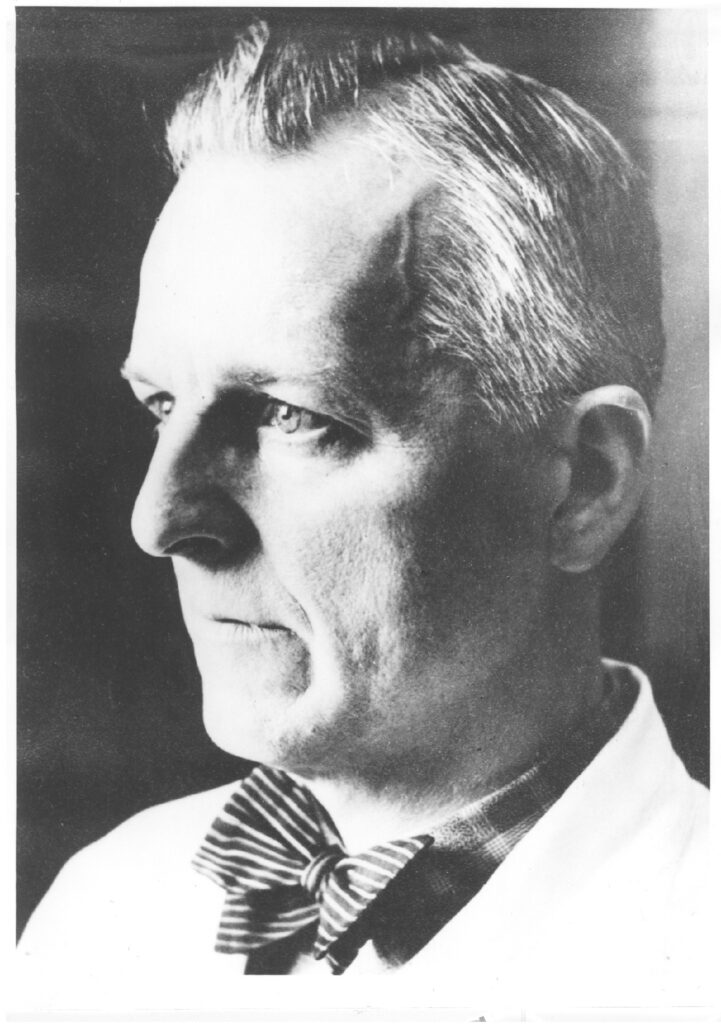
Günther Just, um 1948.
UAG, Porträtsammlung, Just, Günther.
»Die […] Gesetzgebung wird von immer größerem Segen für unser Volk sein; handelt es sich doch um die Befreiung der kommenden Generationen von einer großen Zahl siecher, gemeinschaftsfremder und gemeinschaftsfeindlicher Personen […]« (S. 182)

Ludwig Ferdinand Clauß: Rasse und Charakter (1936).

Ludwig FerLudwig Ferdinand Clauß, 1934.
Aus: Clauß, Ludwig Ferdinand: Als Beduine unter Beduinen, Freiburg i. Br. 1934.
»Die Rassenzugehörigkeit wird […] allzu leicht als Aushängeschild und zur Anmaßung besonderer Rechte mißbraucht. ›Rassenreinheit‹ ist zwar als ein Geschenk Gottes zu werten, bürgt aber durchaus nicht schon durch sich selbst für sittliche ›Hochwertigkeit‹, sondern legt Pflichten auf und schafft Verantwortung.« (S. 108)
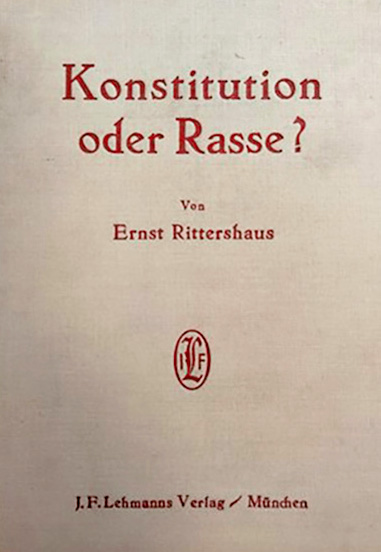
Ernst Rittershaus: Konstitution oder Rasse? (1936).
»Das Ziel der sogenannten ›Nordischen Bewegung‹ ist allein, in unserem Rassengemische den letzten Rest des nordischen Blutes vor der völligen Vernichtung zu bewahren, und den zahlenmäßigen Anteil desselben in unserem Volke, wenn es überhaupt noch möglich ist, wieder etwas zu stärken.« (S.191)
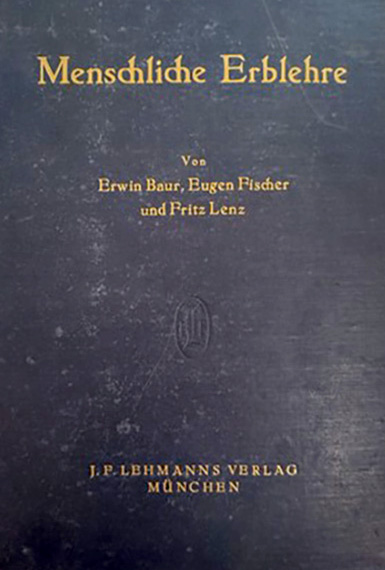
Erwin Baur/Eugen Fischer/Fritz Lenz:
Menschliche Erblehre (1936).
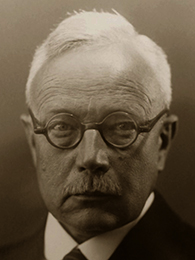
Erwin Baur, vor 1933.
Michal Šimůnek/Peter Ruckenbauer/Uwe Hoßfeld (2015):
A half forgotten album, S. 14.
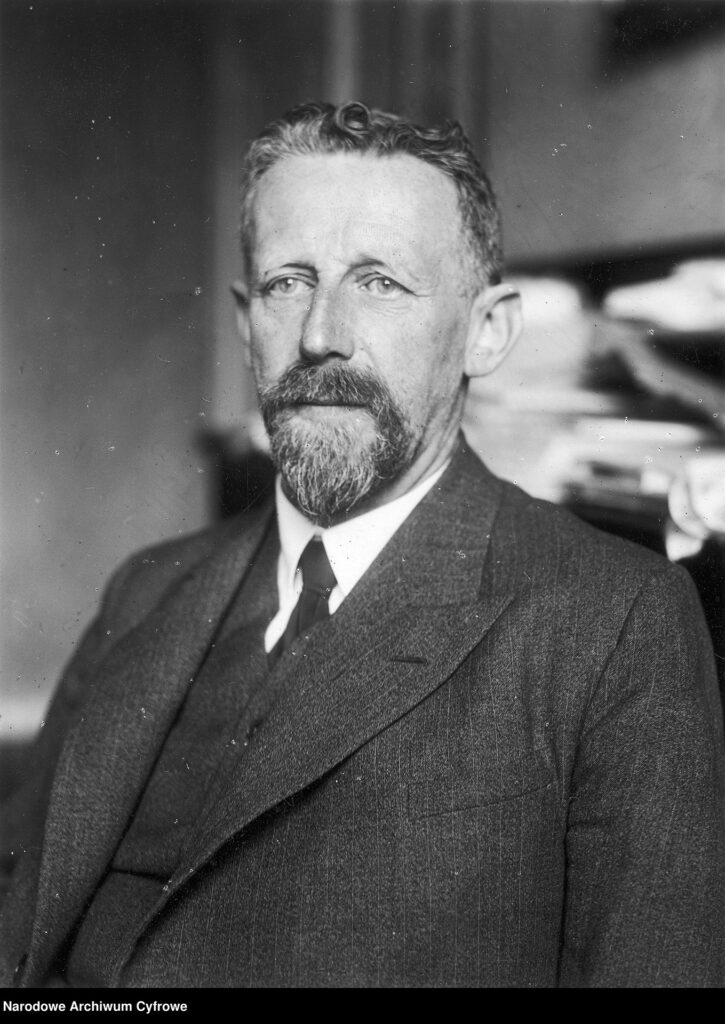
Eugen Fischer, undatiert.
Narodowe Archiwum Cyfrowe | Digitales Nationalarchiv Polen.
»Für die Einleitung und Durchführung der rassenhygienischen Auslese aber ist eine Erneuerung der Weltanschauung nötig. […] Diese Erziehung zu einer organischen Weltanschauung hat der Nationalsozialismus in Angriff genommen […]« (S. 773)
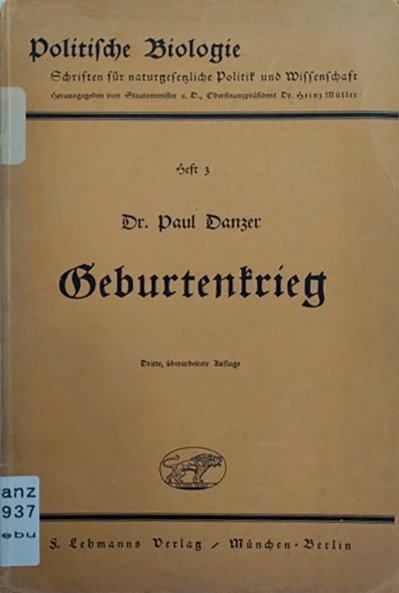
Paul Danzer: Geburtenkrieg (1937).
»Ein Volk kann reicher werden an Begabung und Erbwerten, wenn die Begabten und Hochwertigen der nächsten Generation überdurchschnittlich viele Kinder hinterlassen und die schlecht Begabten, […] unterdurchschnittlich viele.« (S. 13)
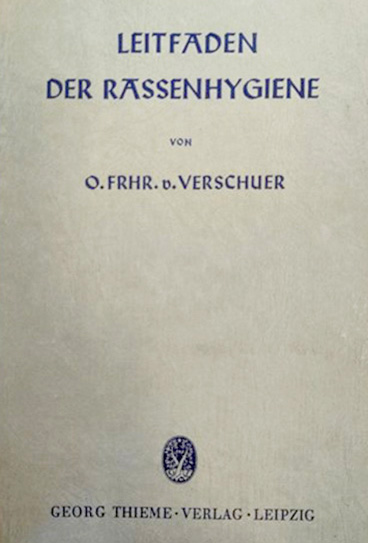
Otmar Freiherr von Verschuer: Leitfaden der Rassenhygiene (1941).
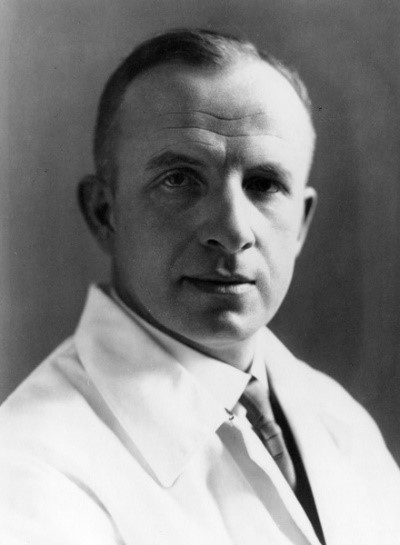
Otmar Freiherr von Verschuer, um 1940.
Archiv der Max-Planck-Gesellschaft, Berlin, VI. Abt., Rep. 1, Verschuer I/5.
»Die Erbbiologie ist die wichtigste Grundlage der Rassenhygiene; alle Unterschiede zwischen den Menschen und alle Auslesevorgänge wären im Hinblick auf die Zukunft der Menschheit bedeutungslos, wenn die Unterschiede zwischen den einzelnen Menschen, sozialen Gruppen, Völkern und Rassen nicht erbbedingt wären.« (S. 10)
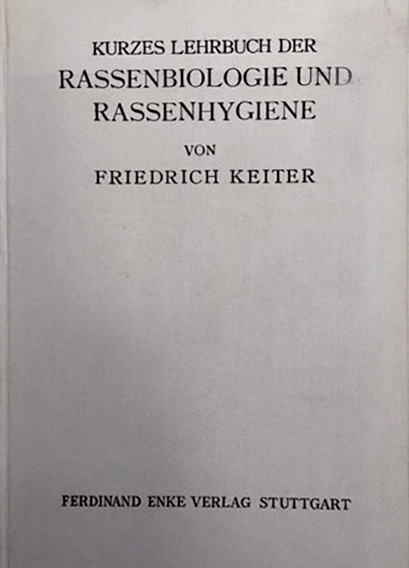
Friedrich Keiter: Kurzes Lehrbuch der Rassenbiologie und Rassenhygiene (1941).
»Der Kern des Nationalsozialismus ist Gesundung nach einem lebensfeindlichen intellektualistischen, überkünstelten Zeitalter.« (S. 1)

Otmar Freiherr von Verschuer (Hg.): Der Erbarzt Bd. 9 (1941/1942).
»Aber wie häufig ist doch eine einzige Anlage von so ungeheurer Bedeutung, daß alle anderen Erbanlagen daneben praktisch bedeutungslos sind. Denken Sie etwa an eine Erbanlage für Schwachsinn. Sie zerstört fast den ganzen Wert eines Menschen.« (S. 6)
This cabinet contains relevant books that reflect the thinking between 1902 and 1942. There is a quote from each book that conveys the core idea. As the books contain derogatory texts and images, they are kept under lock and key.

Joseph Arthur de Gobineau: Experiment on the inequality of human races (1902).

Joseph Arthur de Gobineau, 1876.
Copy ArEGL.
»This is what history teaches us. It shows us that every civilisation stems from the white race, that none can exist without the aid of this race, […]« (p. 285)

Fritz Lenz: Human Selection and Racial Hygiene (1932).

Fritz Lenz, after 1945.
Archive of the Max Planck Society, Berlin Dahlem.
»We value the progress of culture, the progress of knowledge, technology and the economy. The pioneering leaders of this progress are praised as great spirits. But all this becomes meaningless if culture collapses as a result of the degeneration of the race […]« (p. 554)

Ernst Wegner: Racial Hygiene for everyone (1934).

Ernst Wegner, 1933, in: Deutscher Reichstag, Reichstags-Handbuch, 8th electoral period, Berlin 1933, p. 367 [excerpt].
Bayerische Staatsbibliothek. BA/Germ.g 390c-1933.
»[…] and it is the taxpayer who is healthy and capable of inheritance who has to bear the burden of welfare. While public funds are only rarely available for the children of healthy people, imbeciles and criminals have to be supported from public funds.« (p. 157.)

Ernst Rüdin: Heredity and Racial Hygiene in the National State (1934).

Ernst Rüdin, um 1935.
Copy ArEGL.
»Our aim is to breed a sufficient number of carriers of mental health […], but without accepting the curse of mental illness. The people want […] the proper multiplication of the healthy gifted […] but not to breed the mentally ill.« (p. 163)

Günther Just: Inheritance (1936).

Günther Just, um 1948.
UAG, Porträtsammlung, Just, Günther.
»The […] legislation will be of ever greater blessing to our people; after all, it is a matter of liberating future generations from a large number of vile, anti-community and anti-social individuals […]« (p. 182)

Ludwig Ferdinand Clauß: Breed and character (1936).

Ludwig FerLudwig Ferdinand Clauß, 1934.
From: Clauß, Ludwig Ferdinand: As a Bedouin among Bedouins, Freiburg i. Br. 1934.
»Racial affiliation is […] all too easily misused as a badge of honour and for the arrogation of special rights. Although ‘racial purity’ is to be regarded as a gift from God, it does not in itself guarantee moral ‘high value’, but imposes duties and creates responsibility.« (p. 108)

Ernst Rittershaus: Constitution or race? (1936).
»The sole aim of the so-called ‘Nordic Movement’ is to save the last remnants of Nordic blood in our racial mix from complete annihilation and to strengthen the numerical proportion of this blood in our people, if it is still possible at all.« (p.191)

Erwin Baur/Eugen Fischer/Fritz Lenz:
Human heredity (1936).

Erwin Baur, before 1933.
Michal Šimůnek/Peter Ruckenbauer/Uwe Hoßfeld (2015):
A half forgotten album, p. 14.

Eugen Fischer, undated.
Narodowe Archiwum Cyfrowe | Digitales Nationalarchiv Polen.
»For the introduction and implementation of racial-hygienic selection, however, a renewal of the world view is necessary. […] This education towards an organic worldview has been tackled by National Socialism […]« (p. 773)

Paul Danzer: Birth war (1937).
»A nation can become richer in terms of talent and hereditary values if the gifted and high-quality ones leave an above-average number of children to the next generation and the poorly gifted, […] a below-average number.« (p. 13)

Otmar Freiherr von Verschuer: Guide to racial hygiene (1941).

Otmar Freiherr von Verschuer, around 1940.
Archive of the Max Planck Society, Berlin, VI. Abt., Rep. 1, Verschuer I/5.
»Hereditary biology is the most important basis of racial hygiene; all differences between people and all selection processes would be meaningless with regard to the future of humanity if the differences between individual people, social groups, peoples and races were not hereditary.« (p. 10)

Friedrich Keiter: Short textbook of Racial Biology and Racial Hygiene (1941).
»The core of National Socialism is recovery after a hostile, intellectualist, over-artificial age.« (p. 1)

Otmar Freiherr von Verschuer (Hg.): Der Erbarzt Bd. 9 (1941/1942).
»But how often is a single trait of such immense importance that all other hereditary traits are practically insignificant. Think, for example, of a hereditary disposition for feeblemindedness. It destroys almost the entire value of a person.« (p. 6)
Ta szafka zawiera odpowiednie książki, które odzwierciedlają sposób myślenia w latach 1902-1942. Każda książka zawiera cytat, który przekazuje główną ideę. Ponieważ książki zawierają obraźliwe teksty i obrazy, są przechowywane pod kluczem.

Joseph Arthur de Gobineau: Eksperyment nad nierównością ras ludzkich (1902).

Joseph Arthur de Gobineau, 1876 r.
Kopia ArEGL.
»Tego uczy nas historia. Pokazuje nam, że każda cywilizacja wywodzi się z białej rasy, że żadna nie może istnieć bez pomocy tej rasy, […]«. (Str. 285)

Fritz Lenz: Selekcja ludzi i higiena rasowa (1932).

Fritz Lenz, po 1945 r.
Archiwum Towarzystwa Maxa Plancka, Berlin,
VI. Dept. 1, Lenz, Fritz 2, fotograf A. Blankhorn.
»Cenimy postęp kultury, postęp wiedzy, technologii i gospodarki. Pionierscy przywódcy tego postępu są chwaleni jako wielkie duchy. Ale wszystko to staje się bez znaczenia, jeśli kultura upada w wyniku degeneracji rasy […]«. (Str. 554)

Ernst Wegner: Higiena rasowa dla wszystkich (1934).

Ernst Wegner, 1933. W: Niemiecki Reichstag, Podręcznik Reichstagu, 8. kadencja parlamentu, Berlin 1933, s. 367 [fragment].
Bawarska Biblioteka Państwowa. BA/Germ.g 390c-1933.
»[…] i to podatnik, który jest zdrowy i zdolny do dziedziczenia, musi ponosić ciężar opieki społecznej. Podczas gdy fundusze publiczne są rzadko dostępne dla dzieci zdrowych ludzi, imbecyle i przestępcy muszą być wspierani z funduszy publicznych«. (Str. 157)

Ernst Rüdin: Teoria dziedziczna i higiena rasowa w państwie narodowym (1934).

Ernst Rüdin, około 1935 roku.
Kopia ArEGL.
»Naszym celem jest wyhodowanie wystarczająco dużej liczby nosicieli zdrowia psychicznego […], ale bez akceptowania przekleństwa choroby psychicznej. Ludzie chcą […] właściwego rozmnażania zdrowych, utalentowanych […], ale nie hodowania chorych psychicznie.«. (Str. 163)

Günther Just: Dziedziczność (1936).

Günther Just, około 1948 r.
UAG, Porträtsammlung, Just, Günther.
»Ustawodawstwo […] będzie coraz większym błogosławieństwem dla naszego ludu; w końcu chodzi o uwolnienie przyszłych pokoleń od dużej liczby chorych ludzi, którzy są wyobcowani i wrogo nastawieni do społeczności […]«. (Str. 182)

Ludwig Ferdinand Clauß: Rasa i charakter (1936).

Ludwig FerLudwig Ferdinand Clauß, 1934.
Aus: Clauß, Ludwig Ferdinand: Als Beduine unter Beduinen, Freiburg i. Br. 1934.
»Przynależność rasowa jest […] zbyt łatwo nadużywana jako figura i arogancja specjalnych praw. Chociaż „czystość rasowa“ powinna być uważana za dar od Boga, sama w sobie nie gwarantuje moralnej „wysokiej wartości“, ale nakłada obowiązki i tworzy odpowiedzialność«. (Str. 108)

Ernst Rittershaus: Konstytucja czy rasa? (1936).
»Jedynym celem tak zwanego ‚ruchu nordyckiego‘ jest ocalenie ostatnich resztek nordyckiej krwi w naszej mieszance rasowej przed całkowitym unicestwieniem i wzmocnienie liczbowej proporcji nordyckiej krwi w naszym narodzie, jeśli jest to w ogóle możliwe«. (Str.191)

Erwin Baur/Eugen Fischer/Fritz Lenz:
Dziedziczność człowieka (1936).

Erwin Baur, vor 1933.
Michal Šimůnek/Peter Ruckenbauer/Uwe Hoßfeld (2015):
A half forgotten album, S. 14.

Eugen Fischer, bez daty.
Narodowe Archiwum Cyfrowe | Digitales Nationalarchiv Polen.
»Dla wprowadzenia i realizacji selekcji rasowo-higienicznej konieczna jest jednak odnowa światopoglądu. […] Ta edukacja w kierunku organicznego światopoglądu została podjęta przez narodowy socjalizm […]«. (Str. 773)

Paul Danzer: Wojna narodzin (1937).
»Naród może stać się bogatszy pod względem talentów i wartości dziedzicznych, jeśli osoby utalentowane i wysokiej jakości pozostawią następnemu pokoleniu ponadprzeciętną liczbę dzieci, a osoby słabo utalentowane […] liczbę poniżej przeciętnej«. (Str. 13)

Otmar Freiherr z Verschuer: Przewodnik po higienie rasowej (1941).

Otmar Freiherr z Verschuer, około 1940 r.
Archiv der Max-Planck-Gesellschaft, Berlin, VI. Abt., Rep. 1, Verschuer I/5.
»Dziedziczna biologia jest najważniejszą podstawą higieny rasowej; wszystkie różnice między ludźmi i wszystkie procesy selekcji byłyby bez znaczenia w odniesieniu do przyszłości ludzkości, gdyby różnice między poszczególnymi ludźmi, grupami społecznymi, narodami i rasami nie były dziedziczne«. (Str. 10)

Friedrich Keiter: Krótki podręcznik biologii rasowej i higieny rasowej (1941).
»Rdzeniem narodowego socjalizmu jest odbudowa po wrogiej, intelektualistycznej, nadmiernie sztucznej epoce«. (Str. 1)

Otmar Freiherr z Verschuer (Hg.): Lekarz dziedziczny, tom 9 (1941/1942).
»Ale jak często pojedyncza cecha ma tak ogromne znaczenie, że wszystkie inne cechy dziedziczne są praktycznie nieistotne. Pomyślmy o dziedzicznej skłonności do słabego umysłu. Niszczy ona prawie całą wartość danej osoby«. (Str. 6)

